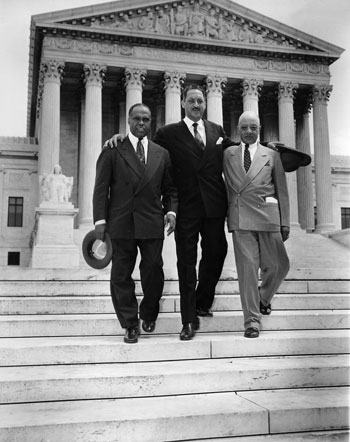|
| http://www.historicaldocuments.com/ |

|
| Lawyers who led fight before the U.S. Supreme Court for abolition of segregation in public schools |
Chase
Cantrell, et. al. v. Jennifer Granholm
Case Overview: On
Tuesday, November 7,
2006, citizen of Michigan voted overwhelmingly to prohibit the state from
“discriminating against or granting preferential treatment to any individual or
group on the basis of race, sex, ethnicity, color, or national origin in the
operation of public contracting, public education, and public employment” (pacificlegal.org)
or what has been commonly referred to as Proposal 2. This decision greatly
impacted the affirmative action awards granted to minority, including women,
students who were admitted to the University. There have been many cases on
affirmative action and the use of race for admission decisions. From 1978 with
University of California v. Bakke where the ruling concluded that race may be
used to achieve diversity in higher education and with the most prominent cases
of Gratz v. Bollinger, where Graz won her lawsuit because the Supreme Court
concluded that it was unconstitutional for the college admission process to
award an applicant a set number of points solely because the applicant wasn’t
white (findlaw.com). However, Barbara Grutter was defeated in Grutter v.
Bollinger because the University of Michigan proved that the admissions process
followed the University of California v. Bakke case. Proposal 2 has sparked a wave of controversial and litigious
responses. The issue of the Cantrell v.
Granholm case of 2008 is whether Proposal 2 violates the Equal Protection
Clause of the Fourteenth Amendment. Plaintiffs argue that the Proposal
definitely unconstitutional and violates the Fourteenth Amendment because it
uses the racial nature of an issue to define the governmental decision making
structure, and imposes substantial and unique burdens on racial minorities as
set forth in Washington v. Seattle School
District No. 1, 1982. (Cantrell v.
Granholm, 2008). Document 220 presents the issue as to “Whether the Court”
should deny Defendant’s motions to dismiss and/or for summary judgment in their
favor and enter summary judgment that Michigan Constitution Article I (Proposal
2) is unconstitutional” (Cantrell v.
Granholm, 2008). The case will be heard by Judge David Lawson in Michigan’s
Federal District Court.
Key Holdings: Cantrell, et. al.
submitted a case citing several arguments against the defendants, specifically
Jennifer Granholm’s office as Governor and the state’s Attorny General, to
dismiss and/or for summary judgment. First, Cantrell asserts that Proposal 2
poses a direct “constitutional injury” because of the burden to secure
race-conscious admissions policies and the inability to enact the right to
equality in the political process. Second, the case submits that Proposal 2
imposes a substantial and unique political burden on individuals seeking to
restore race-conscious admissions policies at the University of Michigan, Wayne
State University and Michigan State University, by making it practically
impossible to secure those policies (Cantrell
v. Granholm, 2008).
Impact on Higher Education: Cantrell
v. Granholm has been called
“the most important civil rights case before any court in the nation”
(michigandaily.com). The National Association for the Advancement of Colored
People, NAACP, concludes that the ban on affirmative action programs will cut
off the pathway towards higher education for many students of color
(naacpld.org). However, understanding the impact on the minority access to higher
education, the impact on higher education institutions must also be considered.
The Michigan proposal has influenced five other institutions in Arizona,
Colorado, Nebraska, Oklahoma, and Missouri, to include language to “not
discriminate against, or grant preferential treatment to, any individual or
group on the basis of race, sex, color, ethnicity, or national origin
(michiganreview.com).
| http://brotherpeacemaker.wordpress.com/2008/04/28/ |

|
| An Argument Against Affirmative Action |
|
